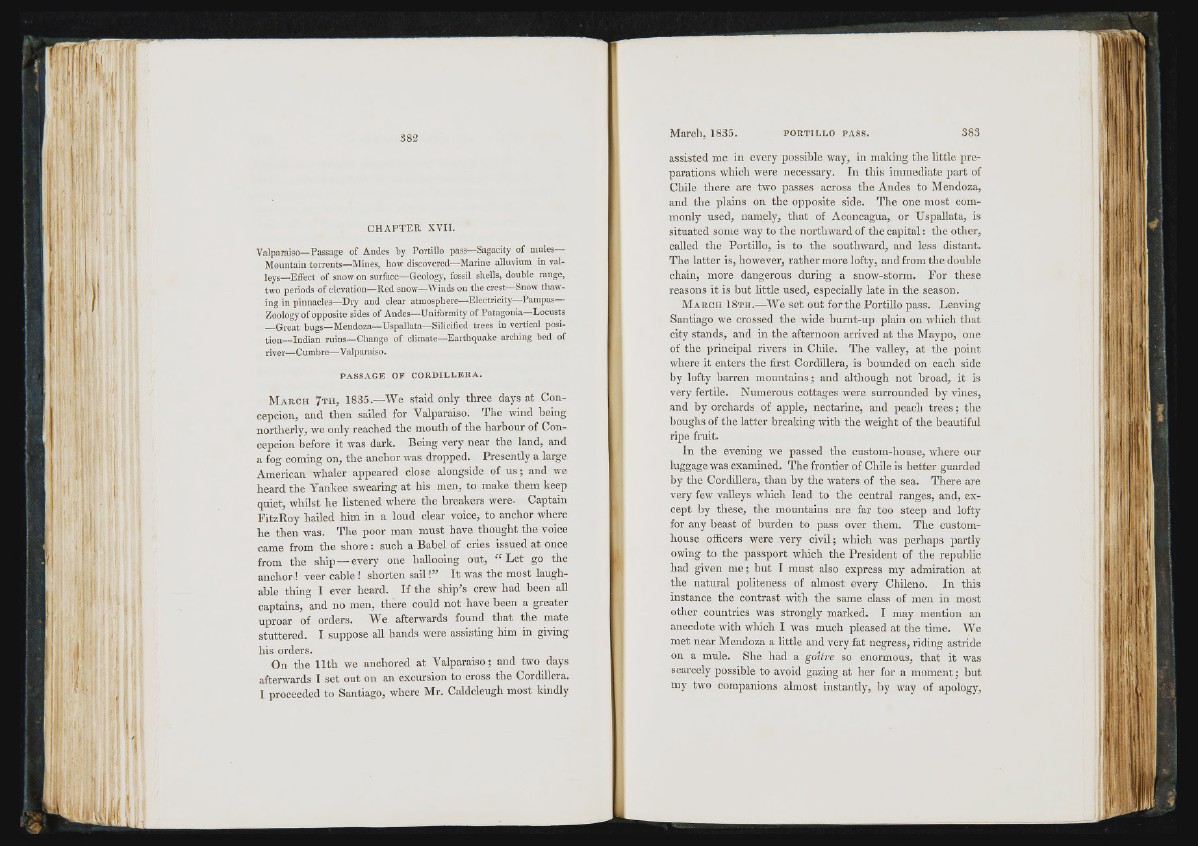
C H A P T E R X V I I .
V a lp a ra iso— P a s s ag e o f A n d e s b y P o r tillo pass— S ag acity o f m u le s
M o u n ta in to r r e n ts— M in e s , h ow d isco v e red— M a rin e a llu v ium in valley
s— E ffe c t o f sn ow o n su rfa c e— G eo lo g y , fossil sh e lls , d o u b le ran g e ,
tw o p e rio d s o f e le v a tio n— R e d sn ow— W in d s o n th e c re s t— Sn ow th aw in
g in p in n a c le s— D ry a n d c le a r a tm o s p h e re— E le c tr ic ity— P am p a s—
Z o o lo g y o f o p p o s ite sid es o f A n d e s— U n ifo rm ity o f P a ta g o n ia L o c u s ts
— G r e a t b u g s— M e n d o z a— U s p a lla ta— Silicified tre e s in v e rtic a l p o s itio
n— I n d ia n ru in s— C h a n g e o f c lim a te— E a r th q u a k e a rc h in g b e d o f
r iv e r— C um b r e— V a lp a ra iso .
P A S S A G E O F C O R D I L L E R A .
M a r c h 7 t h , 1 8 3 5 .— We staid only three days at Concepcion,
and then sailed for Valparaiso. The wind being-
northerly, we only reached the mouth of the harbour of Concepcion
before, it was dark. Being very near the land, and
a fog coming on, the anchor was dropped. Presently a large
American whaler appeared close alongside of us; and we
heard the Yankee swearing at his men, to make them keep
quiet, whilst he listened where the breakers were. Captain
FitzRoy hailed him in a loud clear voice, to anchor where
he then was. The poor man must have thought the voice
came from the shore: such a Babel of cries issued at once
from the ship — every one hallooing out, “ Let go the
anchor! veer cable ! shorten sa il!” It was the most laughable
thing I ever heard. If the ship’s crew had been all
captains, and no men, there could not have been a greater
uproar of orders. We afterwards found that the mate
stuttered. I suppose all hands were assisting him in giving
his orders.
On the 11th we anchored at Valparaiso; and two days
afterwards I set out on an excursion to cross the Cordillera.
I proceeded to Santiago, where Mr. Caldcleugh most kindly
assisted me in every possible way, in making the little preparations
which were necessary. In this immediate part of
Chile there are two passes across the Andes to Mendoza,
and the plains on the opposite side. The one most commonly
used, namely, that of Aconcagua, or Uspallata, is
situated some way to the northward of the capital: the other,
called the Portillo, is to the southward, and less distant.
The latter is, however, rather more lofty, and from the double
chain, more dangerous during a snow-storm. For these
reasons it is but little used, especially late in the season.
M a r c h 1 8 t h .—We set out for the Portillo pass. Leaving
Santiago we crossed the wide burnt-up plain on which that
city stands, and in the afternoon arrived at the Maypo, one
of the principal rivers in Chile. The valley, at the point
where it enters the first Cordillera, is bounded on each side
by lofty barren mountains; and although not broad, it is
very fertile. Numerous cottages were surrounded by vines,
and by orchards of apple, nectarine, and peach trees; the
boughs of the latter breaking with the weight of the beautiful
ripe fruit.
In the evening we passed the custom-house, where our
luggage was examined. The frontier of Chile is better guarded
by the Cordillera, than by the waters of the sea. There are
very few valleys which lead to the central ranges, and, except
by these, the mountains are far too steep and lofty
for any beast of burden to pass over them. The customhouse
officers were very civil; which was perhaps partly-
owing to the passport which the President of the repubhc
had given me; but I must also express my admiration at
the natural politeness of almost every Chileno. In this
instance the contrast with the same class of men in most
other countries was strongly marked. I may mention an
anecdote with which I was much pleased at tlie time. We
met near Mendoza a little and very fat negress, riding astride
on a mule. She had a goitre so enormous, that it was
scarcely possible to avoid gazing at her for a moment; but
my two companions almost instantly, by way of apology.